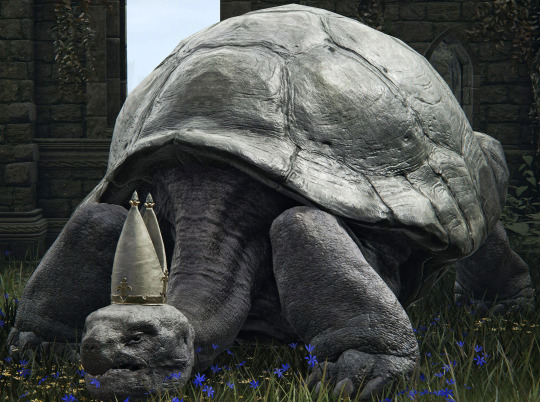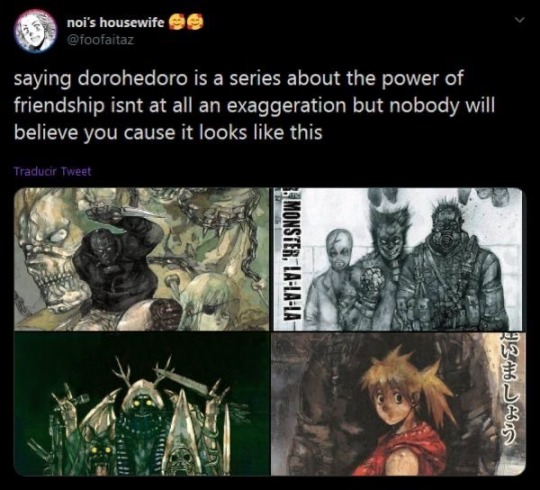nothing to see here (except my preferred pronouns, which are they / them)
Last active 60 minutes ago
Don't wanna be here? Send us removal request.
Text
i love miriel, but i don't read him this way at all. imo miriel can only be understood in his relation to radagon, and more specifically, to the ideals radagon embodied at one particular time.
radagon, after all, did not conquer raya lucaria - he tried, failed to, then married its queen, and then "aspire[d] to become complete" by studying both sorcery and incantations (radagon icon) and creating a school of magic that requires faith and intelligence in equal measure.
that's radagon's entire deal: attaining completeness of himself and the perfection of the golden order, by combining faith and knowledge, the study of the order and of the stars. he is in that way a picture-book universal scholar, a renaissance man, and i don't think it's a coincidence that radagon's prayerbook is named the golden order principia, likely referencing isaac newton's philosophiæ naturalis principia mathematica (often simply called the principia). even the laws - causality and regression - seem like more abstract versions of newton's laws of motion (action and reaction -> causality) and gravitation (the pull of masses -> the pull of meanings -> regression). it bears remarking that newton, likewise, was an unconventional but nevertheless faithful christian, and considered his laws compatible with belief in a christian-style god, and many scholars of the so-called enlightenment had similar ideals. while these parallels are in some sense external to elden ring, i still think they tell us something about the character radagon and his beliefs.*
all this to say: conjoining (all) things is not antithetical to radagon's golden order; on the contrary, it is that order's primary ideal; as someone in the replies pointed out, kenneth haight even explicitly spells this out for us ("nobility is no prerequisite for serving the true order"; "even the vulgar [in this case: the demi-humans] shall not be left behind, under the rule of true order").
the point of the story, to me, is that radagon with his ambitions of creating a set of universal, world-spanning and all-encompassing principles, fails, and his order ultimately proves inadequate. all cannot be conjoined, or assimilated, into one set of universal principles and beliefs; one set of eyes cannot see everything, one mind cannot understand everything, etc.; and the attempt to do so quickly descends into violence and repression. people fall outside the order (be it the misbegotten, those afflicted with rot, those who live within death...) and are brutally subjugated, murdered, or simply banished, hidden from view underground or at the fringes of the world.
miriel in my eyes is a lovable relic of that first idea: someone who genuinely believes in the ideal of a good order that can be achieved through universal learning. his position as bishop at the church of vows, where radagon and rennala married, fits this image very nicely. but it is noteworthy that from his sunny spot in the church of vows, he can see the erdtree and the academy from afar, in all their splendour, but not, say, the catacombs beneath leyndell, where the royal omens are locked away, and all the many other sites at which the crimes committed in the name of conjoining all things are still visible.
his position is still a sympathetic one to me. he wants to believe in the good and the beautiful in this promise - a promise made, after all, in the form of a wedding, itself an occasion of joyous conjoinment, at his church! and in that way, he shows us the beauty that radagon's ideals may once have held. miriel helps us understand the character radagon when he was only an imperfect man with a grand and beautiful ambition, before he became the monster that we know him as. but the promise, like the marriage, was ill-fated. the order worked only through repression, and ultimately it was shattered.
so when it comes to picking the most radical elden ring character, i think i'll personally stick with ranni, not for her actions - though those speak of impressive commitment to her ideals - but for her vision:
"mine will be an order not of gold, but the stars and moon of the chill night. i would keep them far from the earth beneath our feet. as it is now, life, and souls, and order are bound tightly together, but i would have them at great remove. and have the certainties of sight, emotion, faith, and touch... all become impossibilities."
ranni wants to do away with the ideals of certain and perfect universal order that her father strove for, and that people like the noble goldmask still desire. she chooses an order that is distant and uncertain, far from perfect, but that allows not only for her own freedom, but for the freedom of everyone in the lands between that suffered under the towering erdtree and its omnipresent order.
that said, miriel is still perfect because how could huge turtle with mitre be anything else. so clearly the conjoining all things bit must have worked out for him personally.
.
.
.
* tarnished archaeologist on youtube elaborates on this connection in their 3 creeds of the erdtree video, though a lot of the other things they say in that video should be taken with a grain of salt imo
Turtle Pope is the most radical character in all of Elden Ring.
"No it's Ranni, who slew her brother in a bid for autonomy and power" "No it's Rykard who started an assassin cult to overthrow the Erdtree" "No it's Miquella who--"
No. Sh. Listen to me. Listen, my child. Listen to Pastor Miriel's wisdom.
When you hand him a prayerbook or spell scroll, Miriel says to the Tarnished, "Oh, what have we here? Very well, let us both learn together. Heresy is not native to the world; it is but a contrivance. All things can be conjoined."
This is a game about religious fundamentalism and the deeply held beliefs of the characters involved, and how these things intertwine with politics and war. Marika hates the hornsent so much (understandably for what she suffered) that this hatred became a nigh-religious decree within her Golden Order, causing others to view them as cursed when before they were blessed. Radagon believed in the purity of the Golden Order so much that his entire school of magic is called "Fundamentalism". There are entire schools of magic dedicated to destroying Those Who Live in Death, considered a grave heresy for simply existing at all. This is an Order that declares 7 new outgroups before eating breakfast each day.
And what does this random turtle tell you? That heresy does not exist. That blasphemy is made up. That the outgroups are arbitrary. And that if you are truly brave enough, *all* things--all ideas, all people--can be learned from.

709 notes
·
View notes
Text


A D&D commission for @rndrndrndrnd
Commissions are Open!
23 notes
·
View notes
